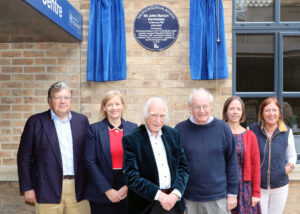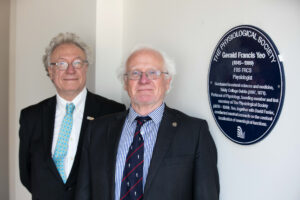As 2022 draws to a close, we are pleased to reflect on what has been a very successful year for The Society. While it has been difficult to choose highlights, here is our top 10 moments from the last 12 months.
And 2023 promises to be even better. It will see us delivering on our innovative new strategy, with an exciting new scientific conference programme and a new Open Access future for Experimental Physiology. Our policy programme begins in the Scottish Parliament in February and we look forward to announcing exciting plans for our professional development.
2022 highlights
1. Recognising our proud heritage
As soon as COVID-19 allowed, The Society hit the road to raise the visibility of physiology with senior leadership at institutions across the UK and Ireland, touring our Board meetings and roadshows to meet our members.
Whilst moving The Society forward is key to maintaining relevance, it is important to acknowledge our heritage and to build on this distinguished past. The Society’s Blue Plaque scheme honours outstanding physiologists who have contributed to the advancement of the discipline through their discoveries while leaving a legacy beyond their lifetime. We now have over 15 Blue Plaques at institutions right across the UK and Republic of Ireland, including Sir Charles Sherrington at Liverpool and Oxford, Professor Mary Pickford in Edinburgh, Professor Henry Barcroft in Belfast, Professor Gerald Francis Yeo in Dublin and Professor Thomas Graham Brown in Cardiff.
Find out more about our Blue Plaque Scheme
2. Raising the visibility of physiology
More than ever before, science is now a political and policy priority. Building and maintaining an effective R&D landscape is now a top priority for UK politicians and policymakers, as demonstrated by the historic increase in public research funding committed by the Government.
From healthy ageing, playing a leading role in the response to COVID-19 or taking centre stage in the fight against climate change, research by physiologists is essential to tackling the grand challenges facing the world.
In 2022 we have been more visible than ever before. In June we brought over 100 physiologists to Parliament to meet MPs to highlight the economic and social contribution of physiology education to the UK economy. In November we were again in Parliament for the launch of our report recommending that Government introduces a Healthy Ageing Workforce Strategy.
Find out more about our policy work
3. Launching our new strategy
In December we launched our new five-year strategy, which sets out our vision of a world in which physiological discovery leads to healthier lives. Our mission over the strategic period is to:
- Increase the visibility of physiology as essential to tackling global challenges and act as catalyst for the dissemination of knowledge
- Champion equity, inclusion and diversity
- Forge a sustainable future for The Society
We will focus on three strategic pillars, centred around strengthening the physiology community, securing the future of the discipline and using physiological evidence to improve public health.
We are proud of history while relentlessly focused on the future. From climate change to healthy ageing, the future will be shaped by physiology. This strategy is our call to action for all physiologists and all those invested in this better future: come and help us change the word.
4. Putting EDI at the heart of our activities
Our research communities must become more inclusive of a wider range of voices and perspectives and all of us involved in science have a responsibility to redouble efforts to promote diversity. Our new strategy has Equity, Diversity and Inclusion (EDI) at its heart, and our EDI Taskforce have worked with an expert consultant to develop our new EDI Roadmap. This Roadmap focuses on a 4-point plan with measurable KPIs that addresses the five biggest barriers to inclusion and diversity
- Lack of self-awareness
- Biased development opportunities
- Lack of role models
- Low cognitive diversity
- Fear of making mistakes
5. Showcasing how physiology changes the world
As our world changes, we need to harness physiology to ensure we can prepare and protect those who are affected most. The Physiological Society is working to convert research into action. To ensure the very survival of life on our planet.
Launched at the Member forum our new promotional video shows how from the basic unit of life to the complex behaviour of the whole body, physiology underpins our survival and is key to improving health, treating disease and tackling global challenges like climate change.
6. Returning to in person events
Following the COVID-19 pandemic, it has been fantastic to return to in person events this year. We have toured the UK and Ireland with our Member Roadshows and restarted our conferences programme, including visiting Nottingham for Biomedical Basis of Elite Performance. In October we visited Copenhagen with our European partners for Europhysiology 2022.
Our 2023 conferences programme is looking set to be our best ever. We have seven meetings across the country, including our Annual Conference in beautiful Harrogate.
7. Tackling the greatest health threat facing humanity
The World Health Organization has identified climate change as the single biggest health threat facing humanity.
Physiologists are playing a key role in delivering on climate change mitigation and adaption goals. From furthering our understanding of adaption to heat and extreme weather, to maximising human health while reducing food and agricultural emissions, physiological research is helping the fight against climate change.
From events to reports, throughout 2022 The Society has played a leading role in convening experts, identifying research areas and shaping the response to this threat.
Find out more on our Climate Hub
8. Transitioning Experimental Physiology to Open Access
Since it was established in 1908, Experimental Physiology has published research articles that report novel insights into homeostatic and adaptive responses in health, as well as those that further our understanding of pathophysiological mechanisms in disease.
This year we were excited to announce that from January 2023 Experimental Physiology will be fully Open Access. This is the most significant change to its publishing model in its history and represents a fantastic opportunity for research in Experimental Physiology to reach as wide an audience as possible.
9. Improving our sustainability
Our sustainability strand has been focused on the future of The Society and the discipline, as well as the health of the world in which we live.
We have recently launched our new Sustainability Policy, which seeks to reduce The Society’s impact on the environment but considering how we operate and manage our activities.
Read our sustainability policy
10. Celebrating a thriving discipline
In December we were delighted to welcome 150 physiologists, leaders, funders and policy makers to our Member Forum and President’s Lecture.
Sir Patrick Vallance delivered the 2022 President’s Lecture and we celebrated our Rob Clarke Awards, 2022 Fellow Members and 2022 Honorary Fellows.






